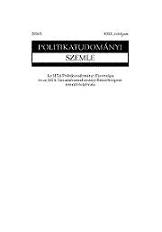A VEZÉREK „RÉGI-ÚJ” ESZKÖZE:A politikai mozgalmak funkciója a demokráciában
THE LEADERS’ OLD-NEW INSTRUMENTS. THE FUNCTION OF POLITICAL MOVEMENTS IN DEMOCRACY
Author(s): Rudolf Tamás MetzSubject(s): Politics / Political Sciences
Published by: MTA Politikai Tudományi Intézete
Keywords: Theories of democracy; social movement theory; direct democracy; leadership; political movement
Summary/Abstract: The political or social movements, which have embodied the utopia of antipolitics, are born with enormous expectations and leave even bigger disappoint ment, when they pass away with their unfi nished business. This normative burden and the depoliticized perception keep the sociological social movement theory in captivity, which prevent creating a realistic overview of collective actions. Hence I make an attempt with the means of political theory to elucidate its role and function in the political process and democracy. According to my presupposition the three rival theories of democracy – deliberative–participatory, neoclassical – and leader democracy (Pakulski–Korosenyi 2012) – could be connected to the special forms of direct democracy, such as classical direct – referendum – and the so-called “protest-democracy” (Sartori 1999). Thus various concepts of movement could be set up and compared to point out their differences, the limits of deliberative and neoclassical theory and the real nature of movements, which is fundamentally political. Therefore the initial hypothesis is that leader democracy – with its limitations – could apprehend this phe nomenon, so in contrast to the horizontal and bottom-up approaches the main statement of this paper is that the direction of these actions is typically vertical and top-down, and the political movements are just one of the leaders’ instruments.
Journal: Politikatudományi Szemle
- Issue Year: 2014
- Issue No: 1
- Page Range: 105-130
- Page Count: 24
- Language: Hungarian

